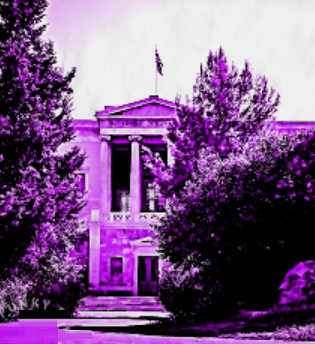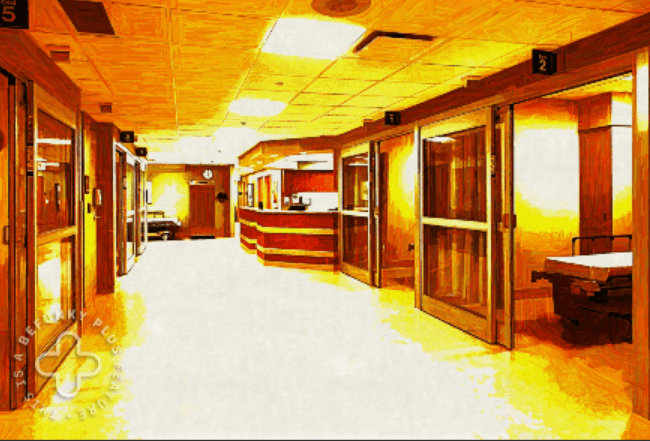My own recollections from those epic but also profoundly emotional days, inside and around the Polytechnic University, that have been recorded historically as “November 17, 1973”, are scattered and fragmented… Something between dream and reality, narrations to a psychoanalyst, and the week’s weather forecast announcement by the Weather Department…
It just so happened that on the exact days that the uprising at the Polytechnic was beginning, I was welcoming back my beloved partner, Alekos, from the military camp of Oresteiada (where he had been conscripted by the dictatorship, following the occupation of the Law School and the torture that he had been subjected to in the holding cells of the Military Police in Athens)… Thus, I was at the Polytechnic for only a few hours in the morning, observing faces and events here and there, as I spent the rest of the day with him in my student flat… And I remember, for instance, seeing my former classmate and roommate, and future bridesmaid, Ioanna Karystiani sleeping on the floor of an auditorium – obviously tired from participating in the previous day’s meetings/assemblies, and standing at the front fence all night long… And also, I remember registering small scenes involving other students from the student movement, some of which I knew and other that I didn’t… I also cannot forget the demonstrations up and down Patision Avenue, with banners reading “Woe to you, Scribes and Pharisees, Hypocrites” and “EEC and NATO are one and the same”… Regardless of whether I agreed then – or do now – with these statements, generally speaking, the spirit that was emitted by the place was a positive one, for both my psyche and my mind. I felt I belonged, and that I was part of this…
The truth is that my personal “dictatorship history” has aspects recorded in both my personal and genogram history, with multiple facets and psychotherapeutic interpretations.
A first example is my participation in the “Law School events”, in the spring of 1973. I hadn’t made it to the “first Law School occupation” and had only watched the events from the square across the street, so I made sure to be one of the first ones in, for the “second Law School occupation”. It turned out that this time around the police raided and ended the occupation. I recall that we ran up all the flights of stairs of the Law School to get to the rooftop, but the cops followed us there and started forcefully removing the students that participated. I was grabbed by one of them and dragged to the floor below while receiving a beating. There, I was grabbed by another one, dragged another floor down while being beaten, and so on… until I reached the ground floor, where the last one did not release me, but instead escorted me to the police van that would take me to the Military Police headquarters. It was then that the survival instinct kicked in and emerged from inside me, putting my bravery and heroism aside. I asked the cop that was trying to put me in the van: “Who is in charge of this vehicle?” The cop found the commanding officer (who was “in charge of the vehicle”) and told him that I was enquiring about him. So he, in turn, came up to me and said proudly: “I am in charge”, to which I answered “You know, I am injured and was told to go to the hospital”… “Go then, Evangelismos Hospital is that way” was the commanding cop’s final judgement, and he let me go (and I ran out of there)… How can we describe this? Was it cowardice? A betrayal of the heroic student movement, or simply the emergence of a sense of self-preservation through “diplomatic” communication tools with the outside world (that could sometimes be very scary)?
Are the answers to these questions ultimately given by history, the history of groups or the self-history of every individual human being? Who knows?
And a final personal example: When the dictatorship issued a statement regarding the students it sought to arrest, and my name was among them, it had the additional interesting element: I was not only wanted under law 509 “for overthrowing the regime”, but also under law 375 “for espionage” (in other words I had become a regular Mata Hari!)... This possibly happened because I was not organized in any union, I did not attend the student meetings in the auditoriums, I was not in the frontline, but at the same time, many of those arrested had said that some meetings had been heldin my flat. And finally – why not – because “Katia” is a name of Russian origins…
I remember our teacher, George Vasiliou, during my training as a psychotherapist in AIA, often asking: “Were you your mother’s or your father’s child?” Back then I had stated “my mother’s”… Yet when the police posted the wanted poster on all Greek ports and airports, my father travelled from Chania, bringing his car over, and drove me to Thessaloniki, where I would hide at his sister’s family house... In short, the dictatorship made me my father’s child TOO…
Living in Thessaloniki, at my aunt’s, uncle’s and cousin’s home, I spent the days locked inside, reading and listening to the radio… One day, after many days of house confinement, I decide to risk going outside for a walk around the neighbourhood and the city. And as luck has it, I bumped into my classmate from school who happened to be studying in Thessaloniki. “What are you doing going outside?” she yelled at me, “don’t you understand that you risk getting arrested?” In order to support me, she brought me a blond wig to wear when I went out. I never actually wore the wig. Maybe, now that I think of it, because I was afraid I was going to be arrested for “illegal prostitution”…
In the end, today (in the epilogue of our lives), we can conclude that we could wear a blond wig, and even attend the Polytechnic uprising once more… If not in life, at least in memory, both personaland collective…


